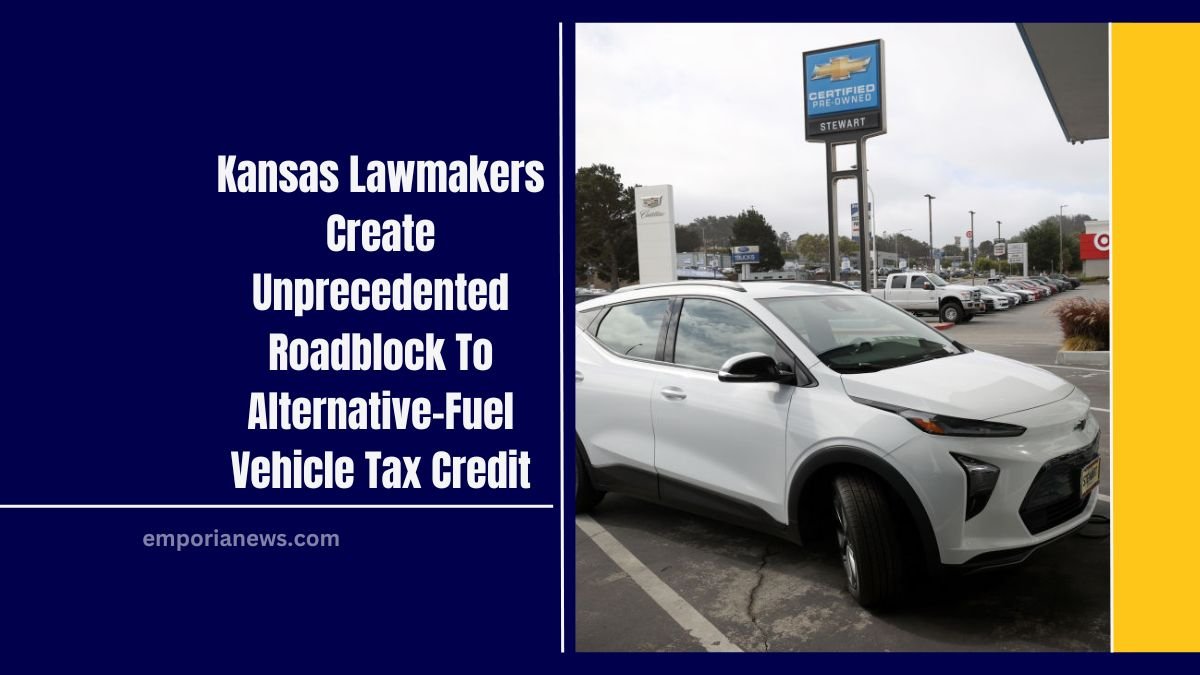Kansas’ once-promising alternative-fuel vehicle tax credit has faced significant challenges due to legislative amendments that exclude electric vehicles (EVs) and bar individual taxpayers from utilizing the credit.
Initially designed to promote the adoption of environmentally friendly and nontraditional fuels, the credit has been dramatically undercut by political decisions and evolving market trends.
Here’s a detailed look into the current state of the program and how it compares to policies in other states.
The Evolution of Kansas’ Alternative-Fuel Tax Credit
The alternative-fuel vehicle tax credit, introduced in 1995, aimed to encourage the use of vehicles powered by fuels like biodiesel, ethanol, and electricity.
At its inception, individuals and corporations could claim a 40% tax credit for the cost difference between gasoline-powered vehicles and their alternative-fueled counterparts.
Key Features of the Original Tax Credit:
- Covered vehicles using electricity, ethanol, or biodiesel.
- Allowed individuals and corporations to claim the credit.
- Included a 40% tax credit on costs for building fueling stations, capped at $100,000 per station.
Subsequent Amendments:
- 2007: Electric vehicles were excluded from eligibility.
- 2012: Individuals were barred from claiming the credit, restricting it solely to corporations.
These changes have significantly reduced the program’s effectiveness and accessibility, leaving Kansas as an outlier among U.S. states.
Comparisons to Other States
While 47 states and Washington, D.C., have strengthened their tax incentives for alternative-fuel and electric vehicles, Kansas has moved in the opposite direction.
Oklahoma’s Example:
- Excludes electricity from its tax-break program but still allows individual taxpayers to claim credits.
- Retains a broader range of incentives to encourage alternative-fuel adoption.
Kansas’ Position:
- Excludes both electric vehicles and individual taxpayers from claiming the credit.
- Focuses narrowly on ethanol and biodiesel, which constitute a shrinking share of the alternative-fuel market.
Impact of Legislative Changes
Market Trends:
- The availability of vehicles compatible with E85 ethanol blends has declined, with only five models available in 2024, representing just 2% of the alternative-fuel market.
- In contrast, electric and hybrid vehicles dominate the market, accounting for 91% of alternative-fuel vehicle sales, with 292 models available.
Decline in Tax Credit Usage:
- Tax credit claims peaked in 2007, with 125 claims filed.
- Over the past decade, fewer than five corporate taxpayers have utilized the credit annually.
- Since 1996, only $2.2 million in credits have been approved, with 20% of claims submitted in 2007 alone.
| Year | Key Changes | Usage |
|---|---|---|
| 1995 | Introduced; included electricity | Individuals and corporations eligible |
| 2007 | Excluded electric vehicles | 125 claims filed (highest ever) |
| 2012 | Barred individual taxpayers | Fewer than 5 claims annually |
| 2024 | Focused on ethanol and biodiesel | Only 5 vehicle models available for E85 |
Challenges and Questions
The Kansas Legislature’s Division of Post Audit recently presented findings highlighting the program’s diminished impact. Among the key concerns raised were:
- Low Adoption Rates: With so few corporations utilizing the credit, questions arise about its relevance in its current form.
- Market Forces: The shift toward electric vehicles, which are ineligible for the credit, underscores the program’s misalignment with consumer trends.
- Lack of Individual Incentives: By excluding individuals, Kansas has missed opportunities to encourage widespread adoption of alternative-fuel vehicles.
Kansas’ alternative-fuel vehicle tax credit, once a promising initiative, has been hampered by legislative changes that limit its scope and effectiveness.
While other states have embraced incentives to promote electric and hybrid vehicles, Kansas has narrowed its focus, leaving corporations as the sole beneficiaries and excluding EVs entirely.
As the transportation market continues to pivot toward electric-powered solutions, Kansas lawmakers may need to reassess the program to align with evolving trends and ensure it provides meaningful benefits to both corporations and individuals.
The future of sustainable transportation in Kansas could depend on these critical policy decisions.
FAQs
Why are electric vehicles excluded from Kansas’ tax credit?
In 2007, the legislature removed EVs from eligibility, focusing instead on ethanol and biodiesel fuels, which benefit Kansas’ agricultural economy.
Who can claim the alternative-fuel tax credit in Kansas?
Only corporations are eligible. Individuals were barred from claiming the credit in 2012.
How does Kansas compare to other states in supporting alternative-fuel vehicles?
Kansas is unique in excluding both electric vehicles and individual taxpayers, while most states offer incentives for EV adoption.




